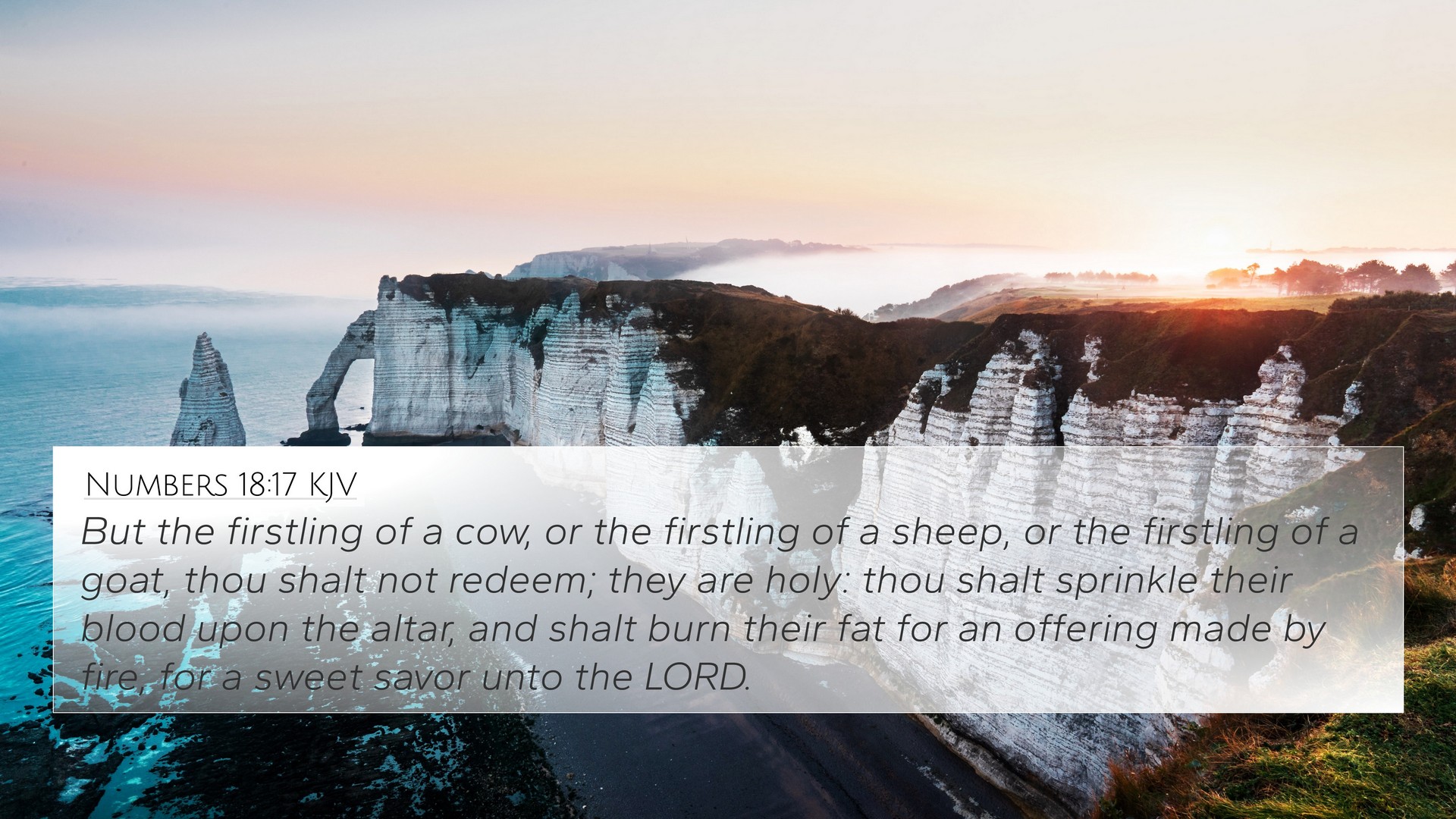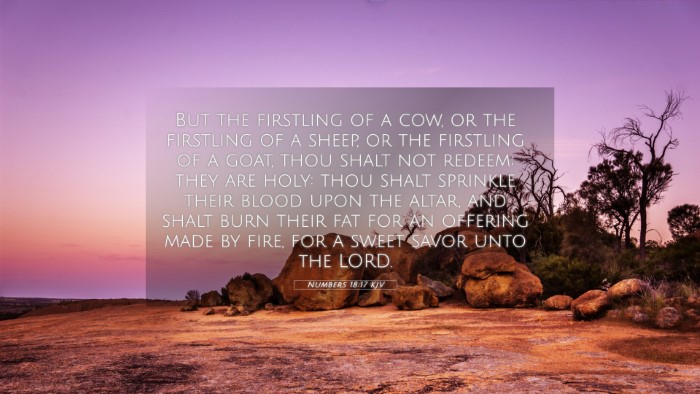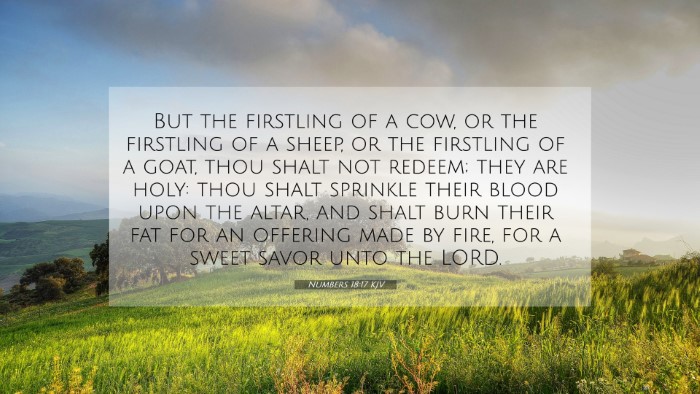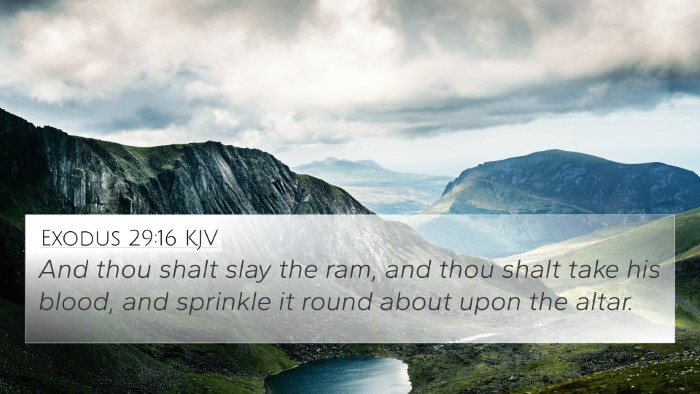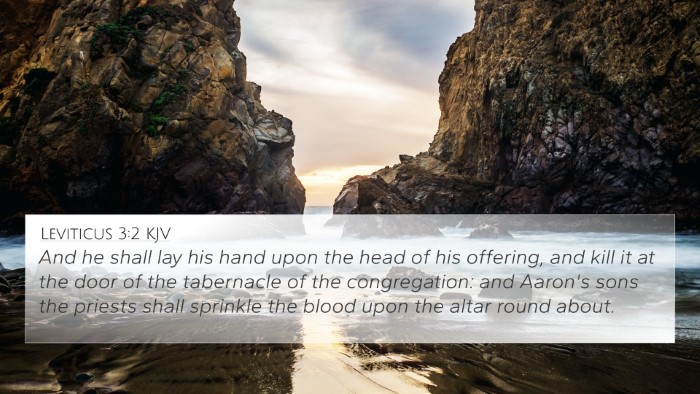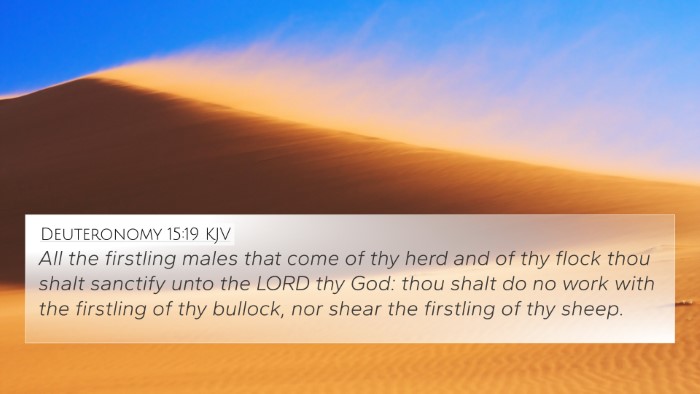Understanding Numbers 18:17
Numbers 18:17 states: "But the firstborn of a cow, or the firstborn of a sheep, or the firstborn of a goat, you shall not redeem; they are holy. You shall sprinkle their blood on the altar and burn their fat as an offering made by fire, for a sweet aroma to the Lord."
This verse presents both a spiritual interpretation and a literal understanding, underscoring the significance of the firstborn in the covenantal context of Israel. Various public domain commentaries provide a multifaceted examination of this scripture.
Commentary Insights
Matthew Henry remarks that the firstborns of animals were considered sacred under the Mosaic law because they were a gift to God from the products of labor and the blessings of nature. The act of not redeeming but offering them underscores a principle of total devotion to God. This reflects a larger theme throughout the Bible about the importance of dedicating the first and best to God, an idea that finds resonance throughout the scriptures.
Albert Barnes emphasizes that the firstborn represented not just the fruit of labor but also the fulfillment of God’s promises. By mandating that their blood be sprinkled on the altar, a connection between life and atonement is drawn, aligning with the ritual demands of the covenant community. This sacrificial practice established a direct link between obedience and blessings.
Adam Clarke elucidates that this ordinance was part of a broader sacrificial system in Israel meant to demonstrate their dependency on God. The reference to the "sweet aroma" signifies divine acceptance of these sacrificial offerings. Clarke also connects this scripture to the concept of firstfruits outlined in various other scriptures, further emphasizing how early offerings are an expression of gratitude and spiritual recognition of God's sovereignty.
Cross-Referencing Biblical Texts
Numbers 18:17 can be cross-referenced with several significant verses that enrich its meaning. Below are some biblical connections:
- Exodus 13:12-15: The principle of dedicating the firstborn is reiterated here, connecting back to the deliverance from Egypt.
- Leviticus 27:26: Establishes the law regarding firstborn animals and their sanctification unto the Lord.
- Deuteronomy 15:19-23: Further elaborates on the treatment of the firstborn in the context of livestock, reinforcing their sacred status.
- Romans 12:1: Paul speaks on presenting oneself as a living sacrifice—a thematic link to the sacrificial system embodied in Numbers.
- Hebrews 11:17: Relates to the faith of Abraham in offering Isaac as a firstborn, drawing connections to themes of sacrifice and covenant.
- 1 Peter 1:19: Highlights the significance of Christ’s sacrifice in relation to the blood of lambs, aligning with the atonement themes in Numbers.
- Revelation 5:6: Mentions the Lamb, connecting the sacrificial system with the ultimate sacrifice of Christ, linking prophetic fulfillment with the laws established in Numbers.
Thematic Bible Verse Connections
The themes that emerge in Numbers 18:17 resonate through both the Old and New Testaments, providing a canvas for understanding divine redemption, sacrifice, and holiness. The connections illustrate how early biblical principles echo in New Testament teachings, establishing a profound theological continuity.
Through comprehensive Bible cross-reference materials, one can gather tools for better understanding and interpreting these verses. The graphic representation of firstborn sacrifices assists in understanding God’s ongoing dialogue through scripture.
Conclusion
Understanding Numbers 18:17 requires contemplating its historical context, its liturgical significance, and its deep theological implications for believers today. The interplay of scriptural cross-referencing illuminates the rich tapestry of biblical themes on sacrifice and stewardship, making this a vital verse for study in the broader narrative of God’s relationship with humanity.
Further Study Suggestions
To delve deeper into the sacrificial themes of the Bible, consider exploring:
- How to use Bible cross-references efficiently in personal study.
- A comprehensive Bible cross-reference guide for deeper insights into thematic connections.
- Identifying connections between the Old and New Testament regarding sacrifice and atonement.
- Comparative studies of Paul's epistles and their relation to Old Testament sacrificial laws.
- The relationship between the teachings of the Prophets and New Testament doctrines.
